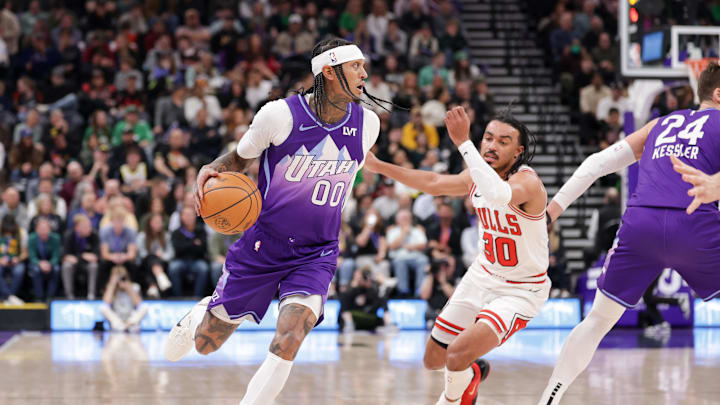Jordan Clarkson is the longest-tenured member of the Utah Jazz, having played for five and a half seasons in Salt Lake City. Since his arrival, he's been popular with the fans and loyal to the team, re-signing twice (2020 and 2023).
He's seen the highs and lows in that time, winning the 2021 Sixth Man of the Year award, making over 800 three-point shots, and seeing his role fluctuate from first man off the bench to DNP-CD when the team was tanking the last two seasons. He has a big role when the Jazz are winning, sometimes looks bad when they're losing, and he's seen his name in trade rumors for much of the past two seasons.
Even with the horrible season the Utah Jazz just had, Clarkson doesn't take much of the blame.
In 2024-25, the team was 9-21 (.300 winning percentage) with Clarkson on the court prior to the All-Star break. They were 7-38 (.150) in games that he missed on the season, and 1-6 in games he played after the All-Star break, when he was impaired by plantar fascitis issues (.358 from the field and .286 from three in that time, as opposed to .417 and .379 before that time this season).
With the recent bad lottery luck of missing out on Cooper Flagg, the Jazz have a lot of offseason decisions to make, including whether to keep Jordan Clarkson for 2025-26 and risk losing him for nothing next summer or make a move now that benefits both sides—getting Clarkson to a winning situation and getting something back that helps the Jazz in their current rebuild.
Trade Jordan Clarkson to the Detroit Pistons
Fresh off a competitive playoff series with the New York Knicks, the Detroit Pistons had a surprising season, going from 14-68 to 44-38 overnight. They are suddenly in a good position—much of their core is young and growing, and they have playoff-tested veterans surrounding them.
Several of those veteran players will enter free agency this summer, however. Even with a projected $30 million in cap space, that might not be enough to keep Tim Hardaway Jr., Dennis Schroder, and Malik Beasley, who made a collective $35.1 million this season.
Detroit also has to decide on who will start alongside Cade Cunningham, Jalen Duren, Tobias Harris, and Ausar Thompson in 2025-26. Cade Cunningham made an All-NBA team this season, which will make him all the more expensive to keep on his next contract.
Cade Cunningham will see his rookie scale extension jump from 25% of to 30% of the cap by virtue of making the All-NBA Third Team:
— Keith Smith (@KeithSmithNBA) May 23, 2025
25-26: $46.4M
26-27: $50.1M
27-28: $53.8M
28-29: $57.5M
29-30: $61.2M
Total: five years, $269.1M
Will it be Jaden Ivey, Tim Hardaway Jr., or Malik Beasley? Ivey is the youngest and has the most promise, as he was blossoming into the player Detroit had in mind before his season sadly ended prematurely from a broken leg.
However, the Pistons played better this season without Ivey (29-20) than with him (15-18), and he's been the subject of trade rumors for the past year or so, which may leave him as the odd man out. By showing some promise, he could be just the young talent the Jazz should take a flyer on.
This trade would help both teams:
Detroit receives: Jordan Clarkson, #21 overall pick in the 2025 draft (from Minnesota via Utah), Lakers 2027 pick (top-10 protected)
Utah receives: Jaden Ivey, 2027 Second Round Pick (from Milwaukee via Detroit)
This gives Utah a young, two-guard that could step in as an immediate starter. Ivey has a team option for 2025-26 at $10.1 million, and a $13.4 million qualifying offer for the summer of 2026.
This gives the Jazz some salary relief in the present ($4 million) and helps move one veteran who isn't aligned with their timeline. It also helps them avoid having too many picks in this draft, while getting a future 2027 pick in a draft where the Jazz didn't have one.
Detroit receives a reliable second-unit scorer in Clarkson, and this deal allows them flexibility. Clarkson's contract expires in the summer of 2026, so Detroit could re-sign him if things work out or move on if needed. Acquiring Clarkson's deal could also make it easier to stomach the loss of Hardaway, Beasley, or Schroder in case their markets are too rich for the Pistons.
Detroit also doesn't have a first-round pick in the 2025 draft, so this would allow them to take a young player at #21, just a few spots below where they would have been picking at #17 if they hadn't dealt their pick away previously. Acquiring that Lakers pick could also make it easier to part ways with Ivey, whom they may not be too sure about keeping.
Overall, both teams get something they want—the Jazz get younger, save money, and get a wing player who can be part of their rebuild, along with a future draft pick; and Detroit gets win-now help and draft assets that help them in the present.
Will the Jazz make this type of move? We'll see. The next month will be full of speculation and rumors as the 2025 NBA Draft approaches.
